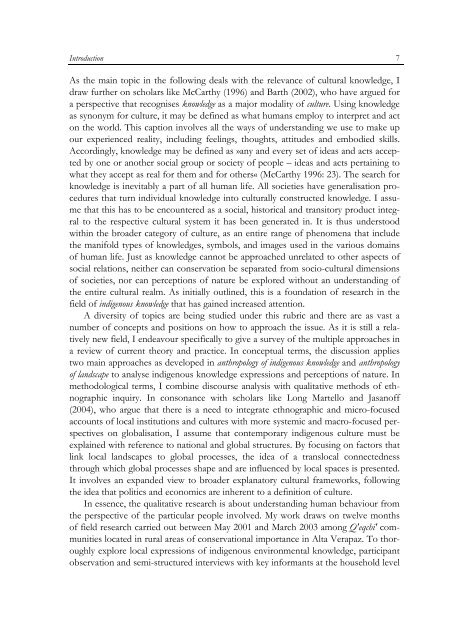The cultural context of biodiversity conservation - Oapen
The cultural context of biodiversity conservation - Oapen
The cultural context of biodiversity conservation - Oapen
You also want an ePaper? Increase the reach of your titles
YUMPU automatically turns print PDFs into web optimized ePapers that Google loves.
Introduction<br />
As the main topic in the following deals with the relevance <strong>of</strong> <strong>cultural</strong> knowledge, I<br />
draw further on scholars like McCarthy (1996) and Barth (2002), who have argued for<br />
a perspective that recognises knowledge as a major modality <strong>of</strong> culture. Using knowledge<br />
as synonym for culture, it may be defined as what humans employ to interpret and act<br />
on the world. This caption involves all the ways <strong>of</strong> understanding we use to make up<br />
our experienced reality, including feelings, thoughts, attitudes and embodied skills.<br />
Accordingly, knowledge may be defined as »any and every set <strong>of</strong> ideas and acts accepted<br />
by one or another social group or society <strong>of</strong> people – ideas and acts pertaining to<br />
what they accept as real for them and for others« (McCarthy 1996: 23). <strong>The</strong> search for<br />
knowledge is inevitably a part <strong>of</strong> all human life. All societies have generalisation procedures<br />
that turn individual knowledge into <strong>cultural</strong>ly constructed knowledge. I assume<br />
that this has to be encountered as a social, historical and transitory product integral<br />
to the respective <strong>cultural</strong> system it has been generated in. It is thus understood<br />
within the broader category <strong>of</strong> culture, as an entire range <strong>of</strong> phenomena that include<br />
the manifold types <strong>of</strong> knowledges, symbols, and images used in the various domains<br />
<strong>of</strong> human life. Just as knowledge cannot be approached unrelated to other aspects <strong>of</strong><br />
social relations, neither can <strong>conservation</strong> be separated from socio-<strong>cultural</strong> dimensions<br />
<strong>of</strong> societies, nor can perceptions <strong>of</strong> nature be explored without an understanding <strong>of</strong><br />
the entire <strong>cultural</strong> realm. As initially outlined, this is a foundation <strong>of</strong> research in the<br />
field <strong>of</strong> indigenous knowledge that has gained increased attention.<br />
A diversity <strong>of</strong> topics are being studied under this rubric and there are as vast a<br />
number <strong>of</strong> concepts and positions on how to approach the issue. As it is still a relatively<br />
new field, I endeavour specifically to give a survey <strong>of</strong> the multiple approaches in<br />
a review <strong>of</strong> current theory and practice. In conceptual terms, the discussion applies<br />
two main approaches as developed in anthropology <strong>of</strong> indigenous knowledge and anthropology<br />
<strong>of</strong> landscape to analyse indigenous knowledge expressions and perceptions <strong>of</strong> nature. In<br />
methodological terms, I combine discourse analysis with qualitative methods <strong>of</strong> ethnographic<br />
inquiry. In consonance with scholars like Long Martello and Jasan<strong>of</strong>f<br />
(2004), who argue that there is a need to integrate ethnographic and micro-focused<br />
accounts <strong>of</strong> local institutions and cultures with more systemic and macro-focused perspectives<br />
on globalisation, I assume that contemporary indigenous culture must be<br />
explained with reference to national and global structures. By focusing on factors that<br />
link local landscapes to global processes, the idea <strong>of</strong> a translocal connectedness<br />
through which global processes shape and are influenced by local spaces is presented.<br />
It involves an expanded view to broader explanatory <strong>cultural</strong> frameworks, following<br />
the idea that politics and economics are inherent to a definition <strong>of</strong> culture.<br />
In essence, the qualitative research is about understanding human behaviour from<br />
the perspective <strong>of</strong> the particular people involved. My work draws on twelve months<br />
<strong>of</strong> field research carried out between May 2001 and March 2003 among Q'eqchi' communities<br />
located in rural areas <strong>of</strong> <strong>conservation</strong>al importance in Alta Verapaz. To thoroughly<br />
explore local expressions <strong>of</strong> indigenous environmental knowledge, participant<br />
observation and semi-structured interviews with key informants at the household level<br />
7

















